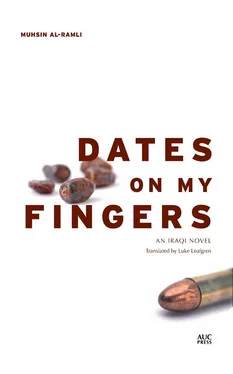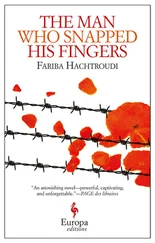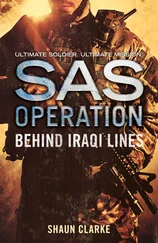The doorman, however, kept treating me affectionately because I would always give him gifts at Christmas: gloves, a shirt, a jacket, cigarettes, newspapers. I remember one Friday after coming back from the mosque I also gave him a box of Middle Eastern sweets as a gift. He was very happy with it.
Two days after the meeting about the trash can, one of the women stopped me on the stairs and said in a threatening tone, “This won’t do. You have to pay. We are in Spain, not in your country. There are laws here.”
What could I say to this? Would she even understand if I told her that the first law in the world had been decreed by an Iraqi, Hammurabi, in his stele? Her tone, her words, the twitching of her jaw, and the hairs coming out of her nose all provoked me.
“Fine,” I replied. “If you have a right over me in anything, make a formal complaint, and obtain your rights according to this law that you are talking about.”
She was silent for a little while. Then she burst into imploring tears. “I’m a widow who’s all alone, and my pension is small. My dog died two months ago, and no one came to comfort me. I’m heartbroken over him, and I cry more than I cried for my husband. Sonny — my dog — was a good dog. Whenever I came in, he would wag his tail and welcome me joyfully. He would go with me for my daily walk around the park. He was—”
I interrupted her when I realized that she was prepared to spend the entire day talking about the virtues of her dead dog. “I’m sorry, ma’am. I’m in a hurry and am waiting for a phone call.”
The flow of her tears stopped, and she said in a different tone altogether, “So will you contribute to the payment?”
“No,” I said. “Excuse me, goodbye.”
Then I turned and went up the stairs without looking back. Behind me, I heard her muttering words that were certainly insults because she slammed her door afterward. What could I say to this old woman, who was older than my mother by perhaps twenty years, and nevertheless looked healthier than her and hadn’t stopped putting on makeup? How could I make her understand the deaths of my brothers, my cousins, Grandfather, and my beloved Aliya, not to mention the castration of my father and the wars, while she was shedding tears over a dog?
After that, all of them started keeping their distance with the exception of my friend, the Cuban. But I kept taking the initiative to greet them whenever I ran into them on the stairs, in the lobby, or at the bread and fruit shop across from our building. Some of them didn’t return the greeting at first, but as time went on, they became content to exchange pleasantries and leave me alone, not inviting me to any further meetings.
I was more comfortable with this isolation: it’s what I wanted. I would enter my apartment, my world, where I lived among my books, my kitchen, my music, and my efforts to improve my Spanish. I would cut out any picture about Iraq that I found in the newspapers. For a period of ten years I hung these up in the apartment, until in the end they crowded the walls of my bedroom, the living room, the hallway, and the kitchen. It was unfortunate that the newspapers would only publish tragic photos of Iraq, such as destroyed buildings, burned-out tanks, flies in the busy markets, and pictures of the dictator’s image in the streets and courtyards and on building façades. For that reason, I did my best to select the least grim of them. I hung them everywhere except the spot where I prayed, behind the living room door. They were all black and white apart from two color postcards, one from Tunis with palm trees, and the other sent to me by my friend from Iran, with minarets and golden domes in the style of the holy city of Karbala. I also had the colorful cover of a Spanish newspaper, which had been designed by computer: a map of Iraq that had fighter jets pointing their tips at it.
I was content in this world of mine where I lived out my first identity, my nostalgia, and my longing for my mother’s embraces, for my siblings, for a visit to Aliya’s grave, for swimming in the Tigris River, for my friends, for our cows, donkeys, chickens, and for the mountain. I yearned for news from them, news about them. How were they now? What had happened? What was happening? Who among them had died? Who had married whom, and what children had they had? What were the new names there? Was it still God — or their finger on the Qur’an — that chose for everyone his name and special verse? I would listen only to Arabic music, and I cooked Iraqi meals.
I had endured much in order to arrive here, and I endured more in order to establish legal residency and to find a way to support myself. I liked living here amid this freedom and this peace. Therefore, when I was out of my apartment, I was one of them, from this place, and I took an interest in what they were interested in: soccer matches, bull fights, celebrity gossip, staying up late on weekends. But when I returned to my apartment, alone, I was from my people, from there.
So it was until my father suddenly appeared, different from the one I left there, different from the one who lived with me in my memories throughout these years. For where would I situate him according to my bifurcated world? His former image was firmly established within my inner world: my memory, the apartment, these black-and-white pictures, and blood relations. But now I see that he does not belong to it. At the same time, I can’t exactly consider him part of my outside world.
His friends here were not like my friends. His work was not like mine, nor his behavior. Indeed, he did not resemble himself. His women did not resemble my women. Or at least, they did not resemble those I had met, since I didn’t have women for the most part — or at all. The only woman I had gone out with during my time here was Pilar.
I met Pilar six years ago, when I went one weekend to a club with my friends, who were my co-workers. She was introduced to me by Antonio, who was responsible for reviewing the addresses of the newsstands and bookstores, along with the names and quantities of the newspapers we distributed. Pilar was a post office employee. She had a voluptuous body and was a little shorter than me. Her round face overflowed with vitality and desire, and her hair was cut short so you could see that her neck still looked the right length.
After exchanging some words to get to know each other at the bar, Pilar said, “This is a beautiful Brazilian song. Will you dance with me?”
“I don’t know how to dance,” I said. “Do you understand what this song is saying?”
“It doesn’t matter,” she said. “And don’t think that all these dancers know the song lyrics or that they know how to dance. The important thing is to feel the beat. Then you move yourself however you want. There aren’t any specific rules. Come on!”
She pulled me by the hand to the middle of the smoky circle of dancers out on the floor. The illuminated disco ball spun over the heads of those who were themselves spinning in place. With her encouragement, I was actually able to shed my reluctance to go out on the dance floor. We spent hours twisting and touching, happy, laughing, lusting after the bodies that pulsed exuberantly around us, and forgetting everything that wasn’t before our eyes.
Our bodies were sweating. We kept sipping drinks and frequently went to the bathroom. Naturally, there was no clock on the wall, but when we felt tired, we asked, “What time is it now?”
“Quarter to four,” someone replied.
“Let’s go then,” they said.
In the hallway heading out, Antonio whispered to me, “Take Pilar with you.”
“Where?” I said. “When, how, why?”
“Take it easy!” he responded. “Just like that. Just like I said.”
“But I—” I started.
Читать дальше












